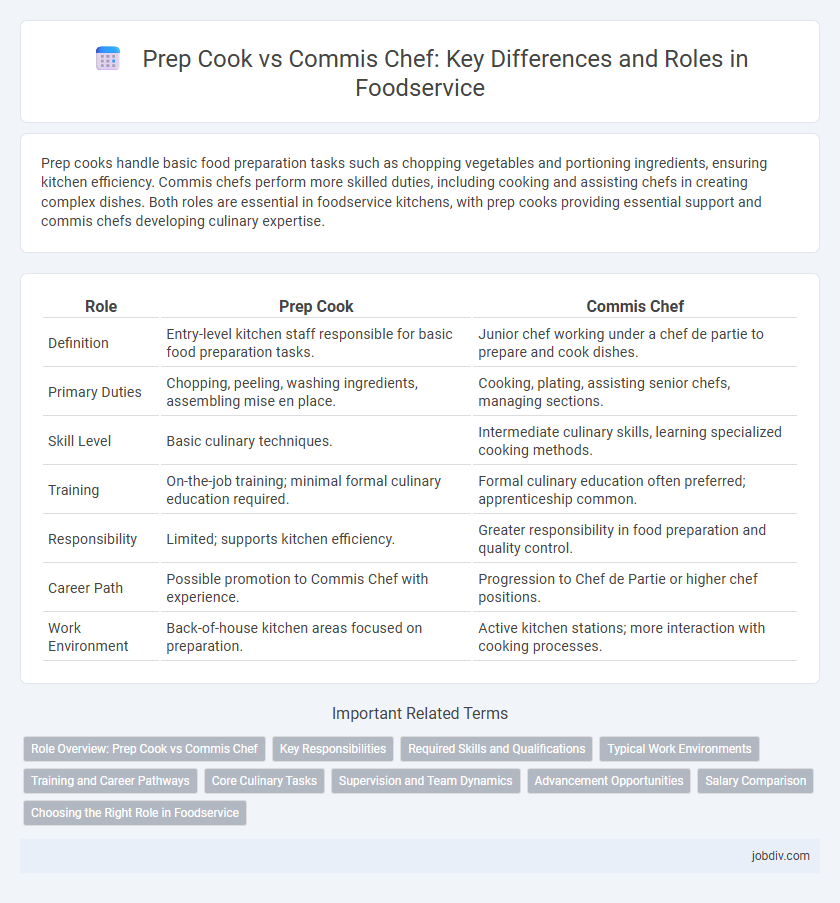Prep cooks handle basic food preparation tasks such as chopping vegetables and portioning ingredients, ensuring kitchen efficiency. Commis chefs perform more skilled duties, including cooking and assisting chefs in creating complex dishes. Both roles are essential in foodservice kitchens, with prep cooks providing essential support and commis chefs developing culinary expertise.
Table of Comparison
| Role | Prep Cook | Commis Chef |
|---|---|---|
| Definition | Entry-level kitchen staff responsible for basic food preparation tasks. | Junior chef working under a chef de partie to prepare and cook dishes. |
| Primary Duties | Chopping, peeling, washing ingredients, assembling mise en place. | Cooking, plating, assisting senior chefs, managing sections. |
| Skill Level | Basic culinary techniques. | Intermediate culinary skills, learning specialized cooking methods. |
| Training | On-the-job training; minimal formal culinary education required. | Formal culinary education often preferred; apprenticeship common. |
| Responsibility | Limited; supports kitchen efficiency. | Greater responsibility in food preparation and quality control. |
| Career Path | Possible promotion to Commis Chef with experience. | Progression to Chef de Partie or higher chef positions. |
| Work Environment | Back-of-house kitchen areas focused on preparation. | Active kitchen stations; more interaction with cooking processes. |
Role Overview: Prep Cook vs Commis Chef
A Prep Cook primarily handles basic food preparation tasks such as chopping vegetables, measuring ingredients, and maintaining cleanliness, supporting the kitchen's efficiency. A Commis Chef holds a more advanced position, assisting chefs de partie with cooking techniques, plating, and managing sections under supervision to develop culinary skills. Both roles are essential in foodservice operations, with the Commis Chef demonstrating greater responsibility in food preparation and kitchen workflow.
Key Responsibilities
Prep cooks primarily handle ingredient preparation, such as chopping vegetables, measuring ingredients, and organizing mise en place to streamline kitchen operations. Commis chefs perform more complex tasks including basic cooking, assisting chefs de partie, and ensuring consistency in dish presentation. Both roles are crucial for maintaining kitchen efficiency, with commis chefs typically carrying greater culinary skill and responsibility.
Required Skills and Qualifications
Prep cooks must have basic knife skills, food safety knowledge, and the ability to follow simple recipes, making them suitable for entry-level foodservice roles. Commis chefs are required to possess advanced culinary techniques, proficiency in kitchen equipment, and a deeper understanding of flavor profiles and ingredient pairings. Certification in food safety and formal culinary education are often expected for commis chefs, whereas prep cooks typically gain experience through on-the-job training.
Typical Work Environments
Prep Cooks typically work in fast-paced kitchen environments such as casual dining restaurants, catering companies, and institutional cafeterias, handling basic food preparation tasks. Commis Chefs are usually found in more formal or high-end establishments like fine dining restaurants and hotel kitchens, where they assist chefs with complex culinary techniques and presentations. Both roles require adaptability to busy, team-oriented workspaces but differ in their exposure to culinary skills and kitchen hierarchy.
Training and Career Pathways
Prep cooks typically receive on-the-job training focusing on basic food preparation techniques and kitchen safety, serving as entry-level positions in foodservice. Commis chefs undergo formal culinary education and apprenticeships that develop advanced cooking skills, kitchen management, and menu planning, positioning them for progression into higher chef roles. The career pathway from prep cook to commis chef involves gaining practical experience, culinary certifications, and demonstrating proficiency in a variety of cooking methods.
Core Culinary Tasks
Prep cooks primarily handle basic kitchen tasks such as chopping vegetables, portioning ingredients, and maintaining cleanliness, ensuring mise en place is ready for service. Commis chefs execute core culinary tasks including preparing stocks, sauces, and cooking techniques under supervision, contributing to complex dish assembly. Both roles are essential in maintaining kitchen efficiency and consistent food quality in professional foodservice environments.
Supervision and Team Dynamics
Prep cooks perform foundational tasks under close supervision, ensuring ingredients are properly prepared for chefs, while commis chefs engage in more complex cooking techniques with moderate oversight. Commis chefs often act as a bridge between prep cooks and senior chefs, facilitating communication and workflow within the kitchen brigade. This hierarchical dynamic promotes efficiency and skill development, fostering a structured team environment in professional foodservice settings.
Advancement Opportunities
Prep cooks often begin by mastering basic food preparation tasks, which allows them to build foundational culinary skills essential for kitchen operations. Advancement opportunities for prep cooks typically lead to positions such as commis chef, where they gain hands-on experience with more complex cooking techniques and greater responsibility in ingredient preparation. Commis chefs have clear pathways toward roles like demi chef or chef de partie, offering formal growth opportunities that include leadership, menu development, and specialized culinary training in the foodservice industry.
Salary Comparison
Prep cooks typically earn an hourly wage ranging from $12 to $15, reflecting entry-level responsibilities such as ingredient preparation and kitchen cleanliness. Commis chefs command higher salaries, generally between $25,000 and $35,000 annually, due to their more advanced culinary skills and involvement in complex food preparation under the supervision of senior chefs. The salary gap highlights the career progression within foodservice kitchens, with commis chefs benefiting from increased responsibilities and skill development.
Choosing the Right Role in Foodservice
Choosing between a Prep Cook and a Commis Chef role in foodservice depends on career goals and skill development ambitions. A Prep Cook primarily handles basic food preparation tasks, ensuring ingredient readiness for efficient kitchen operations. In contrast, a Commis Chef gains broader culinary experience, often assisting in food production and learning cooking techniques under the guidance of senior chefs, making it a strategic choice for those aiming to advance in professional cooking.
Prep Cook vs Commis Chef Infographic

 jobdiv.com
jobdiv.com